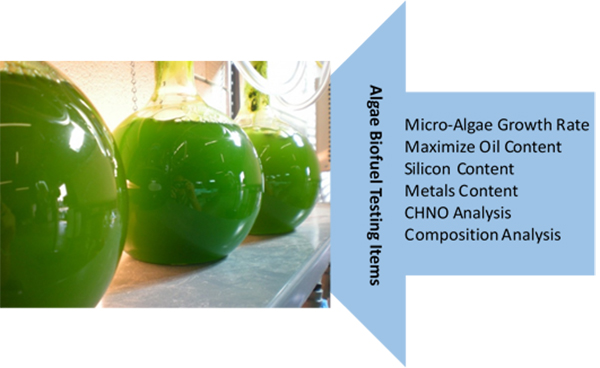Most strains of algae are photosynthetic and represent the world’s fastest growing plants. They are becoming more popular than other common biofuel sources (e.g., corn and sugarcane) to be used as sources of biofuels due to comprehensive applications. For example, the vegetable oil from algae can be used directly to produce biodiesel through biochemical reaction of fatty acid methyl transesterification. Except being esterified into biodiesel, the vegetable oil of algae also could be refined into various biofuels, such as renewable jet fuel and pyrolysis oil. Renewable diesel and jet fuel are most drop-in fuels that could directly replace conventional petroleum fuels without modification of engines. Besides, the carbohydrates (sugars) from algae can be fermented to produce additional biofuels, such as ethanol, butane, plastics, and biochemicals, In addition, biomass from algae could be employed for combined heat and power generation. In the commercial market, many different kinds of algae fuels have been successfully used and tested in a wide range of civilian and military equipment, including vehicles, warships, aircrafts, and so on.
Due to the reduced atmospheric pollution when burning, algae biofuels have been alternatives to liquid fossil fuels, For instance, algae-based biodiesel can reduce greenhouse gas emissions by more than 60 percent compared to conventional fuel like petroleum diesel. Though algae biofuels have been widely used, the quality of algae fuels must be tested to meet all performance criteria. Lifeasible is a world-class provider for the analysis and testing of biofuels derived from algae. At Lifeasible, a number of algae biofuel testing services are available, including micro-algae growth rate determination, maximize oil content, silicon content, metals content, CHNO (carbon, hydrogen, nitrogen, and oxygen) analysis, composition analysis, etc. We can provide rapid and accurate results for these biofuel testing using powerful platforms in Lifeasible, such as elemental analysis platform, including ICP-MS (Inductively Coupled Plasma Mass Spectrometry), XPS (X-ray Photoelectron Spectroscopy), IC (Ion Chromatography), AAS (Atomic Absorption Spectrometer), Organic Element Analyzer, High Frequency Infrared Ray Carbon and Sulphur Analyzer, Oxygen-Nitrogen Analyzer, Automatic Potentiometric Titrator, etc. are dedicated to provide robust technical support for the testing and analysis of metal elements and non-metallic elements.
 Figure 1. Quality testing of algae biofuel
Figure 1. Quality testing of algae biofuel
With cutting-edge technologies and experienced technicians in biofuel testing, our laboratory is fully equipped to support our clients with one-stop services from sampling, logistics, short turnaround testing, to date reporting. For more information, please feel free to contact us.
Lifeasible has established a one-stop service platform for plants. In addition to obtaining customized solutions for plant genetic engineering, customers can also conduct follow-up analysis and research on plants through our analysis platform. The analytical services we provide include but are not limited to the following:
Get Latest Lifeasible News and Updates Directly to Your Inbox
Adaptive Evolutionary Mechanism of Plants
February 28, 2025
Unraveling Cotton Development: Insights from Multi-Omics Studies
February 27, 2025